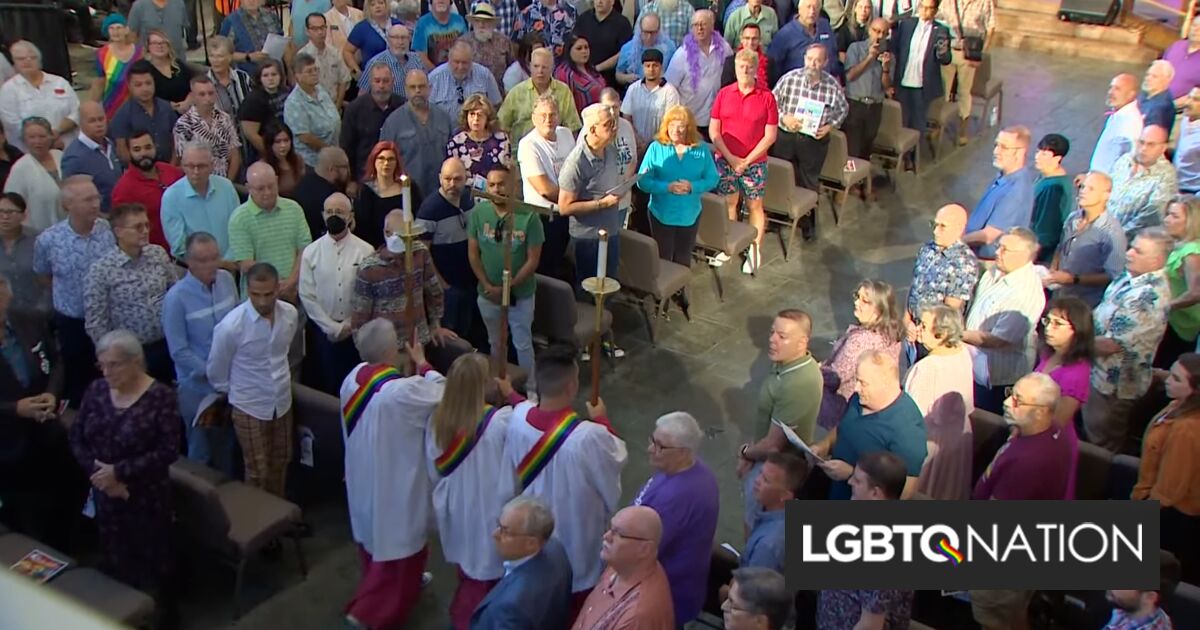The Cathedral of Hope — an LGBTQ±affirming United Church of Christ in Dallas, Texas — has made a concerted effort to defend the queer community from “persecution,” as the state government targets drag queens and transgender people.
The church recently held a service where they blessed drag queens and pledged to “stand for justice, proclaim love, and protect the rights of all people.”
While about three dozen protestors stood outside of the church hurling slurs and threats, approximately 850 people attended the service.
“Anyone check the weather today?!” one protester screamed. “’Cause it might rain fire and brimstone on this church and burn every homo inside!”
But for the ugliness on display outside, the congregation filled the building with love and “radical inclusivity.”
“We recognize that all people are made in the loving image of God, no matter who they are, how they dress, express themselves, or who they love,” the pastor intoned during the service. “We celebrate this divine diversity and commit to lifting up the voices of the LGBTQ+ community and creating spaces where everyone can thrive.”
As one worship leader noted as the pastor gave communion, “Drag queens are often targets of hate and violence.” The Sisters of Perpetual Indulgence, in particular, were singled out for particular honor due to their lifesaving work during the AIDS epidemic.
“These Sisters were at the bedsides of men dying of AIDS,” Rev. Dr. Neil G. Thomas said. “They bring humor, they bring activism, they provide and bring a level of spirituality that many of us have had taken away from us. Despite the humor, they take their spiritual work very seriously.”
The service was a response to recently passed legislation meant to make a drag a crime. The law, passed by Republicans, has been challenged in court by civil rights groups and blocked repeatedly by federal courts.
The law punishes drag performers and venues with a $10,000 fine if they allow a minor to see a “sexually explicit” performance. Such a performance is defined as one in which “a male performer [is] exhibiting as a female, or a female performer exhibiting as a male, who uses clothing, makeup, or other similar physical markers and who sings, lip syncs, dances, or otherwise performs before an audience.”
Lawyers from the Texas Attorney General’s office argued that because the law didn’t specifically mention drag, it wasn’t discriminatory to drag performances. However, in June, Gov. Greg Abbott ® shared a story about the law’s passage that contained the headline, “Texas Governor Signs Law Banning Drag Performances in Public,” and added the comment, “That’s right.” Many state politicians who supported the law also publicly stated that it was meant to target drag, specifically.
But would the law apply to churches? That’s unclear.
“My kid was here,” the lead pastor said. “I don’t have the right to choose to bring my kid to church when there are drag queens?”



That doesn’t mean he hated them. He condemned their behavior and their hypocrisy. He called them out. That is not the same as hate.
Yeah, I knew someone would say this. He’s calling a group of people that are trying to kill him a brood of vipers and damning them to hell. That reads to me as hate. If anyone other than Jesus was making those statements it would be interpreted by most people as hate.
Yes, under Christian theology Jesus doesn’t hate people because that is the backbone of the entire belief system. But without that presupposition, Jesus’s statements to the Pharisees sound a lot like hate.
Edit: But tbf, his hatred is probably directed towards the entire institution rather than the individual members. Like how people hate the police but may not necessarily hate every single police officer.
Thank you for citing the passages, but I similarly to the other commenter disagree that he is saying he hates them rather than their actions.
The word hate isn’t in there. I might call a gang a “brood of vipers” but that wouldn’t mean I necessarily hated them.
Lastly, and for what it’s worth, I’m not clear if the “Seven Woes on the Teachers of the Law and the Pharisees” are meant to be quotes of Jesus or if they are Matthew.
Still, thank you for sharing something specific and not just hand waving.